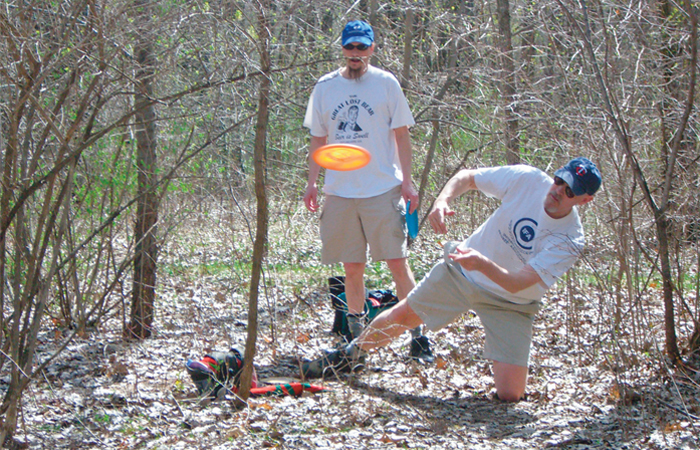
Flying High

Disc golf is more than a diversion for Joe Feidt
Joe Feidt’s 40-year love affair with the sport of disc golf began as a happy accident. Feidt, a 66-year-old writer and editor for DiscGolfer magazine who has inclusion-body myositis (IBM), first discovered the sport in 1976 at a Frisbee tournament in Minneapolis. As it happened, one of his best friends from college was already on the pro Frisbee tour, and he encouraged Feidt to get involved.
“I just happened to get involved right as it was really starting up,” Feidt says. “Disc golf then wasn’t even really a sport; it was one event in competitive Frisbee tournaments.”
Feidt proceeded to fall in love with disc golf (a game in which players throw a flying disc at a series of targets) and soon set up his own course at a park in Minneapolis. In 1977, he created the first disc golf tournament in Minnesota and, to his surprise, a lot of people showed up to play. That tournament is still going today — the 39th annual Kenwood Klassic was held this year.
Since his start in 1976, Feidt has stayed engaged in the disc golf community, playing professionally and for fun, designing courses, hosting tournaments, writing a newsletter and helping to produce DiscGolfer, the official magazine of the Professional Disc Golf Association (PDGA). For all the work he’s done, he was inducted into the Disc Golf Hall of Fame in 2011 and is considered “the father of disc golf in Minnesota.”
Being active in the disc golf community keeps Feidt in good health, so when he began to notice certain small issues around 2013 — jars were harder to open, he lost his grip while waterskiing, and he was having occasional issues with swallowing — he didn’t think much of it. During a routine checkup in 2014, Feidt’s wife, Susan, encouraged him to ask the doctor about his swallowing problem. This started a series of tests and appointments that led to an IBM diagnosis. (Inclusion-body myositis causes progressive weakness of the muscles of the wrists and fingers, the muscles of the front of the thigh and the muscles that lift the front of the foot.)
“It was a surprise,” Feidt says. “I had always been very healthy. As a matter of fact, earlier that year I had applied for life insurance and been given the best rating because I’m so healthy.”
The uncertainty of waiting for a diagnosis while being shuffled through the health care system was overwhelming for Feidt, but learning more about the disease through MDA and other resources helped him put things in perspective.
“It’s kind of a nasty disease,” Feidt says. “But it’s one of those things that just happens. And I’m lucky that in my particular case, the disease is deciding to progress slowly. When I went to my first MDA support group, I was the only one without a cane or walker or wheelchair.”
And for now, Feidt can still get out on the disc golf course.
“I can still play with my friends, and I really enjoy that,” he says. “I’m hoping I can keep on doing it.”
Find more stories of people living unlimited at strongly.mda.org. Learn more about disc golf at PDGA.com.
MDA Resource Center: We’re Here For You
Our trained specialists are here to provide one-on-one support for every part of your journey. Send a message below or call us at 1-833-ASK-MDA1 (1-833-275-6321). If you live outside the U.S., we may be able to connect you to muscular dystrophy groups in your area, but MDA programs are only available in the U.S.
Request Information